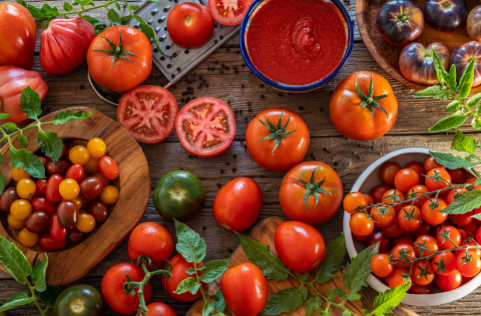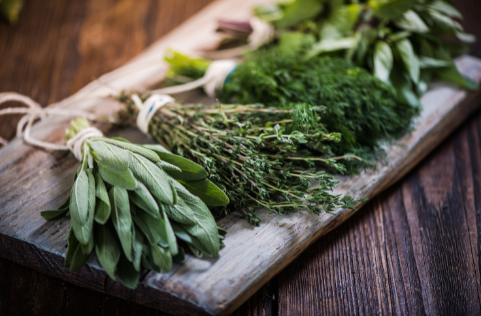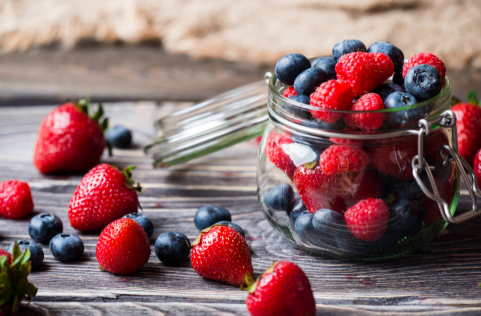If you’ve started to explore intuitive eating you’ve probably noticed that the focus is not on rigid rules, but rather on flexibility, getting curious about how food feels, cultivating self-compassion and forgiveness, and focusing on nurturance and satisfaction. This is where gentle nutrition fits in.
Whereas it’s mainstream for diets to prescribe nutrition commandments without taking other aspects of health into account, intuitive eating takes a broader look at health as the complex and nuanced thing that it is. Recognizing that there is more to health than diet and exercise, gentle nutrition honors what food can and cannot do, and asks you to take a broader look at your intention and mentality surrounding food.

for chronic dieters, intuitive eating may seem to focus very little on nutrition and health...
However, the framework of intuitive eating is backed by hundreds of studies that show (perhaps counterintuitively) that taking the focus off of diet planning and instead focusing on one’s relationship with food and body plays a bigger role in supporting overall health behaviors in the long run. In fact, the framework for intuitive eating was founded by two Registered Dietitians who care deeply about nutrition and the health of their clients.
As dietitians at NourishRX, we also care about nutrition. But we understand the harm that can be caused by focusing only on nutrition without taking into consideration your relationship with food and body.
why gentle nutrition comes last
The 10th and final principle of intuitive eating is Gentle Nutrition. While it’s not necessary to approach intuitive eating like a step-by-step program and unpack each principle consecutively, for most people who are coming to intuitive eating with a chronic dieting or disordered eating history, it’s often necessary to put the focus on nutrition on the back burner at the beginning. In this way, gentle nutrition as the 10th principle is a bit symbolic.
Because of the diet-focused world we live in, the tendency for many is to approach nutrition from the lens of self-control. Intuitive eating asks instead to view nutrition through the lens of self-compassion. When you have done the necessary work to make peace with food, have given yourself unconditional permission to eat, and feel more in tune with your body’s natural hunger, fullness, and satisfaction cues, you may feel ready to approach nutrition from the mentality of self-care.

gentle nutrition comes from "body wisdom" and "brain wisdom"
The basics of intuitive eating center on re-attuning to internal signals from your body like hunger cues and fullness sensations (“interoceptive awareness”). Sometimes, as perhaps you have experienced, it’s not possible to be attuned to the needs of your body because of things that interfere with your ability to sense the internal cues.
I like to illustrate this nuance of Gentle Nutrition as the combination of our “Body Wisdom” and “Brain Wisdom”. Body Wisdom teaches us what hunger and fullness feel like (when the cues are more reliable), as well as what kinds of foods are most satisfying and pleasurable. Brain Wisdom provides the knowledge about when our bodies typically need food, about how much is adequate, and what kinds of foods make our bodies feel good or not-so-good.
using nourishment as self care in gentle nutrition
Gentle Nutrition takes into account both our Brain and Body Wisdom, using nourishment as self-care during times when we may not physically feel a hunger sensation despite our body’s need for fuel.
Some examples of when this might come into play:
-
- After strenuous physical activity when hunger cues are dampened
- During a particularly stressful time of life
- When dealing with anxiety or nausea
- During the first trimester of pregnancy/morning sickness
- After a prolonged period of low intake, like in the early stages of recovery from a restrictive eating disorder
Using Body Wisdom and Brain Wisdom together is also helpful when applying the principles of intuitive eating within the context of a chronic illness or medically-necessary dietary restriction, like Celiac Disease. Body Wisdom can provide useful information about what foods and flavors are satisfying and pleasurable, as well as alert you when you need more fuel via a hunger signal. Brain Wisdom helps support your overall well-being by serving as a guide for food choices that are most helpful to your body.
For example, by honoring both hunger and blood sugar status, it is possible for someone with Diabetes to use the concepts of intuitive eating and gentle nutrition to help guide food choices and timing of meals from a place of self-care rather than self-control.

how to embrace gentle nutrition
consider nutrition as a big picture science
Our bodies don’t magically reset at midnight each night. Our bodies are highly complex and run on a much longer time scale than the 24-hour clock suggests. Bodies, like averages, exhibit patterns that span much longer than a day or even a week. No single food or nutrient is likely to make or break your health. Overall nutrition status is about much more than superfoods and macronutrients. One day without a single veggie will not automatically cause a vitamin deficiency or poor health. Your body is resilient and gentle nutrition is all about the big picture.
eat enough
Arguably more important than balance or variety, eating enough ensures that you are providing your body with the amount of energy it needs to operate all body systems optimally. It’s the reason we can’t just survive off of multivitamins and supplements - without adequate energy, we can’t harness the benefit of vitamins and minerals.
reflect on what feels good
In the beginning stages of intuitive eating, it’s common (and often necessary) to take unconditional permission to mean reincorporating previously off-limits foods in unlimited quantity. That doesn’t mean it’s going to look like this forever. Unconditional permission means you get to choose to eat whatever you want and are eventually able to make a decision rooted in taking care of your body and how it feels. It’s OK if certain foods don’t make your body feel fabulous.
Personally, I’m prone to heartburn on pizza and wine nights, so sometimes I’ll choose another beverage or entree to support my GI tract. Many times, though, if the pizza is delicious and the overall experience of the meal sounds better than taking a pass, I’ll deal with the heartburn because I know it will pass and my body will be able to handle it.
Gentle nutrition is knowing what foods feel good - and doesn’t - but having the flexibility and forgiveness to choose what your priorities are, and knowing that at the end of the day, your health and the intuitive eating journey is not ruined because of one or two negative experiences with food.
focus on adding, not subtracting
Unfortunately, viewing nutrition from the lens of elimination is all too common in diet culture. We’re told to “eat this, not that,” eliminate carbs or other food groups in the name of health, all while forgetting about what we can add in to our diets for more nourishment. First things first, remember that there is no healthful reason to eliminate entire food groups. With the exception of foods you are allergic to, all foods can fit into a diet that supports your health. Next, remember that just because a certain food might offer more nutrients than another, it doesn’t mean we can’t eat the less nutrient-dense option.
If you’re curious about adding more nutrient-dense foods into your diet, you may be able to find ways to add them to recipes and meals you already love. Try stirring in some frozen broccoli into macaroni & cheese, or trying your banana bread recipe with a mixture of whole wheat and all-purpose flour. Be open to exploring your intention here: does your desire for adding nutrient-dense foods come from a place of fear and control? Or does it come from a place of wanting to nurture your body with the nutrients it needs?
explore variety
Variety is the spice of life, as they say! Not only does variety make life more interesting, but it’s also biologically helpful for our bodies to get all the nutrients they need. Steamed broccoli might be full of nutrients, but eating only steamed broccoli is no healthier than eating only potato chips. We need variety in order to support our health.
If you notice your diet is lacking in variety, explore opportunities to add in what’s missing in ways that are satisfying and pleasurable. Perhaps you’ve struggled with vegetables because for so long they were associated with dieting or weight loss, and you never learned how to prepare them in a way that tastes delicious. Now that you know all foods have a place in a healthful diet, you can try exploring different recipes and cooking techniques to get curious about veggies through a lens-free from diet culture.
create flexible structure
Sometimes the best way to support our ability to nourish our bodies is to provide a bit of structure and predictability. This doesn’t mean turning over all the control to a diet or meal plan, but it can mean taking a bit of time to prepare for the week ahead and think about times where it might be harder to find a nourishing option. Some people might find it helpful to map out a week of meals and snacks to help facilitate grocery shopping and have a plan for cooking in place. Others might like to do all the cooking in batches to ensure food is available throughout the week when hunger strikes.
It’s important to have some flexibility and forgiveness here. It’s OK if the week doesn’t go according to plan or if you find yourself craving something else than what you prepared ahead of time. Having some convenient options, like frozen pizza, canned soup, pasta sauce, and dry pasta, frozen meals or take-out menus available for when the day gets away from you are all perfectly helpful options that ensure you are able to still nourish your body when life is busy.

intuitive eating is not about perfection
As always, when navigating through new principles of Intuitive Eating - give yourself grace. Intuitive Eating is not about doing it “right” but instead learning all your body can do for you. As you are moving through your relationship with food, give us a call!
Comments Off on What is Gentle Nutrition?